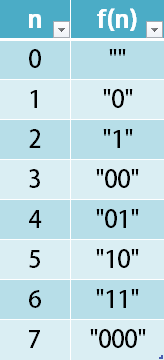Given a non-negative integer num, Return its encoding string.
The encoding is done by converting the integer to a string using a secret function that you should deduce from the following table:
Example 1:
Input: num = 23 Output: "1000"
Example 2:
Input: num = 107 Output: "101100"
Constraints:
<li><code>0 <= num <= 10^9</code></li>
We add one to
The time complexity is
class Solution:
def encode(self, num: int) -> str:
return bin(num + 1)[3:]class Solution {
public String encode(int num) {
return Integer.toBinaryString(num + 1).substring(1);
}
}class Solution {
public:
string encode(int num) {
bitset<32> bs(++num);
string ans = bs.to_string();
int i = 0;
while (ans[i] == '0') {
++i;
}
return ans.substr(i + 1);
}
};func encode(num int) string {
num++
s := strconv.FormatInt(int64(num), 2)
return s[1:]
}function encode(num: number): string {
++num;
let s = num.toString(2);
return s.slice(1);
}